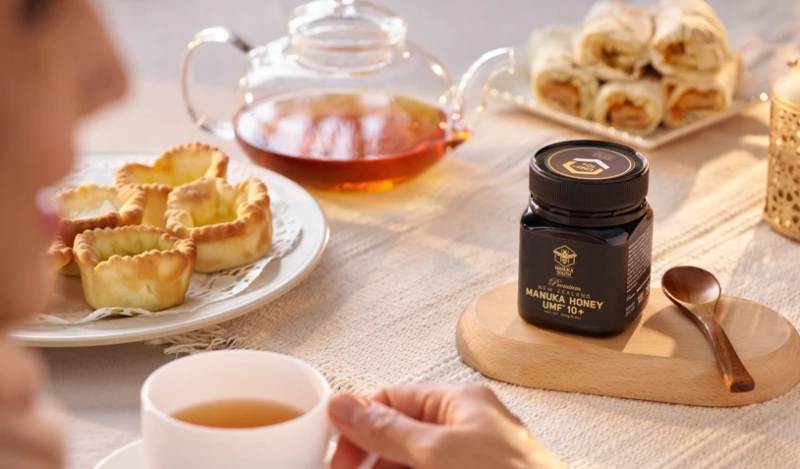Discover The Unique Benefits of Manuka Honey
New Zealand has long been celebrated for its pristine landscapes, but one of its most remarkable gifts comes straight from nature: manuka honey. Unlike regular honey, manuka honey is lauded for its unique antibacterial properties, rich nutrient profile, and wide-ranging health benefits. Over the years, it has earned the nickname “liquid gold” due to both its rarity and its remarkable healing potential. But what makes manuka honey so special, and why has it captured the attention of health enthusiasts worldwide?
What Is Manuka Honey?
Manuka honey is produced by bees that pollinate the native manuka bush (Leptospermum scoparium), which grows predominantly in New Zealand. Unlike standard honey, manuka honey contains a compound called methylglyoxal (MGO), responsible for its antibacterial potency. The higher the MGO concentration, the stronger the antibacterial effect, making it highly valued for both medicinal and culinary purposes.

This honey stands out not only because of its potent health benefits but also because it is relatively rare. The manuka bush only blooms for a short period each year, and producing honey from its nectar is a meticulous process. This limited supply contributes to its premium status, alongside its golden, thick texture and distinctive earthy flavor.
Health Benefits of Manuka Honey
1. Natural Antibacterial Power
Manuka honey is renowned for its ability to combat bacteria. The methylglyoxal content provides antimicrobial effects that can help prevent infections and support immune health. Studies suggest that it can be particularly effective against antibiotic-resistant bacteria, making it a valuable natural remedy in modern medicine.
2. Promotes Digestive Health
Many people struggle with digestive issues such as bloating, indigestion, and acid reflux. Regular consumption of manuka honey may help balance gut bacteria and improve digestive function. Its antibacterial properties can aid in combating harmful bacteria while supporting beneficial strains in the gut.
3. Supports Wound Healing
Manuka honey has been used for centuries to treat wounds, burns, and skin infections. Research shows that its antibacterial qualities help prevent infection and accelerate tissue repair. Medical-grade manuka honey is even used in hospitals worldwide for wound care.
4. Soothes Sore Throats and Coughs
The thick consistency of manuka honey coats the throat, offering relief from irritation. Its antimicrobial properties can also target the bacteria causing the discomfort, making it a natural alternative to over-the-counter remedies.
5. Antioxidant Properties
Manuka honey contains antioxidants, including phenolic compounds, which help protect the body from free radical damage. Antioxidants play a crucial role in supporting overall health and reducing inflammation.
How to Choose the Right Manuka Honey
Not all manuka honey is created equal. When selecting a jar, consider these factors:
- UMF Rating: Unique Manuka Factor (UMF) measures the honey’s antibacterial strength. Look for UMF 10+ or higher for therapeutic benefits.
- MGO Content: The higher the MGO number, the stronger the antibacterial effect.
- Authenticity: Choose honey certified by reputable New Zealand authorities to ensure purity and traceability.
How to Incorporate Manuka Honey Into Your Life
Manuka honey is versatile and easy to use. Here are a few practical ideas:
- Morning Boost: Add a spoonful to your tea, smoothie, or oatmeal for a nutrient-rich start to the day.
- Skincare: Apply it topically on minor cuts or blemishes to support healing.
- Cooking: Use it as a natural sweetener in dressings, marinades, or desserts.
- Natural Remedy: Mix it with warm water and lemon to soothe a sore throat or reduce coughing.
Conclusion
Manuka honey is more than just a sweet treat—it’s a natural powerhouse packed with health benefits. From antibacterial properties to digestive support and skin healing, it truly deserves the title of New Zealand’s liquid gold. Whether consumed daily or used as a natural remedy, incorporating manuka honey into your lifestyle can offer both wellness and indulgence. With careful selection and mindful usage, this golden nectar remains a testament to the richness of New Zealand’s natural offerings.
FAQ Section
1. Is Manuka Honey Better Than Regular Honey?
Yes, due to its unique antibacterial properties and higher MGO content, manuka honey offers health benefits beyond standard honey.
2. Can I Use Manuka Honey Every Day?
Absolutely. Consuming a teaspoon daily can support immunity, digestive health, and overall wellbeing.
3. Does Manuka Honey Help With Skin Problems?
Yes. Its antimicrobial and healing properties make it effective for treating minor cuts, burns, acne, and eczema.
4. How Should Manuka Honey Be Stored?
Keep it in a cool, dry place away from direct sunlight. Unlike many foods, honey doesn’t spoil easily due to its natural preservatives.
5. Is Manuka Honey Safe for Children?
While manuka honey is generally safe for adults and children over one year old, it should never be given to infants under 12 months due to the risk of botulism.


